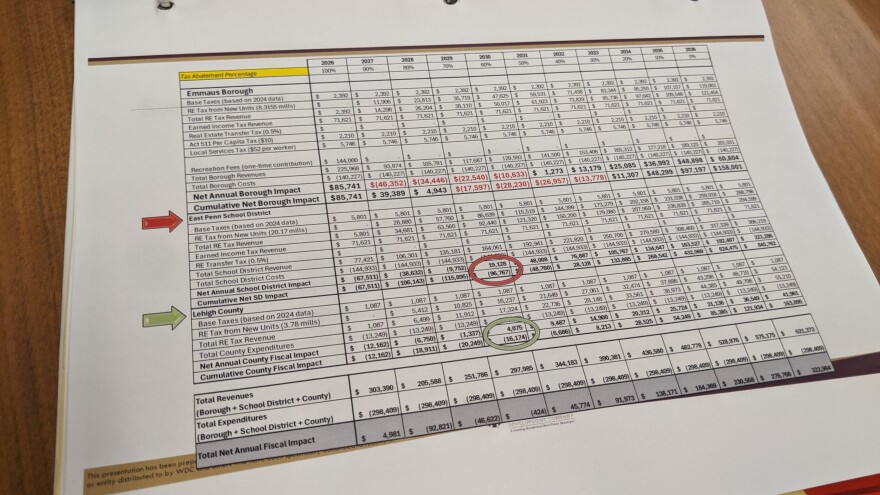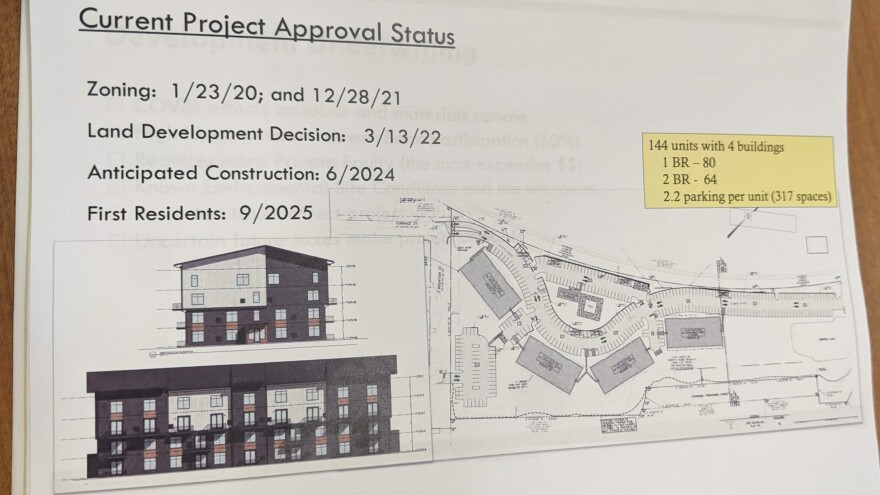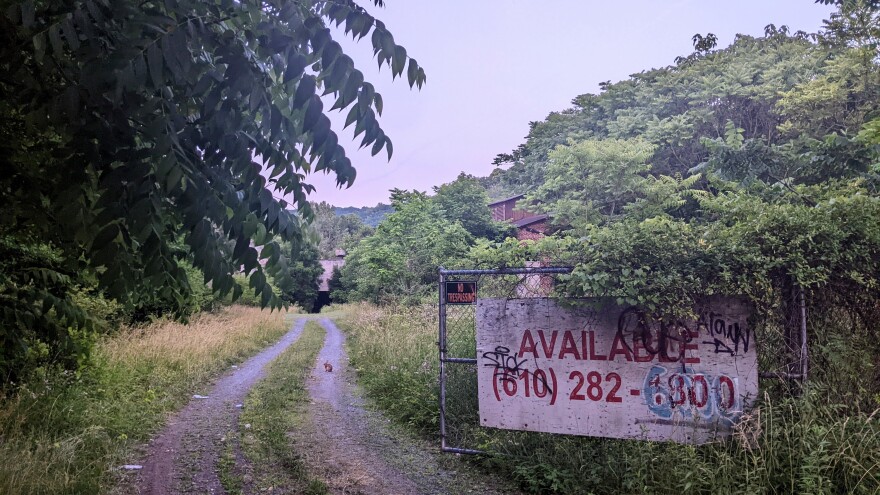EMMAUS, Pa. — A new future could be coming soon for one of Emmaus' most blighted properties, but the question is whether the local government follow a big request of the developers.
Westrum Development Company illustrated its plan to convert a vacant lot at 300 Furnace St. into 144 apartments across four buildings in a presentation Monday to Emmaus Borough Council.
It would consist of 80 one-bedroom and 64 two-bedroom units with 317 parking spaces on the 8-acre parcel.
"It has definitely been labeled in many public documents as our number one blighted property in the borough."Emmaus Borough Manager Shane Pepe
But the developer is seeking a LERTA, or Local Economic Revitalization Tax Assistance abatement, to underwrite its thin profit margins.
The LERTA would phase in real estate taxes on the project improvements over several years.
Borough council voted to have its solicitor write a potential ordinance for a five-year LERTA to be reviewed at future meetings.
According to the borough, the former foundry site has been left unused since 1995 and faces issues of environmental contamination while being functionally obsolete.
"It has definitely been labeled in many public documents as our number one blighted property in the borough," Borough Manager Shane Pepe said.
Project cost estimates climb
Zoning and land development had previously gotten approval from the borough in recent years, with construction anticipated to start this year.
The presentation stated that the first residents in the complex could be anticipated by 2025.
According to the presentation, site investigation and clean-up planning took place during 2019 and 2020.
A clean-up plan to manage soil, remove an underground tank, remove asbestos and take other restoration steps is required before any development.
"We've had over eight different potential buyers spend a considerable amount of mitigation on environmental issues," Pepe said.
"A couple million dollars of environmental issues have already been cleaned up on this property."
Pepe said the project estimates are climbing to more than $38 million, with the potential for more as other hazards may be discovered.
Westrum also cited inflationary costs, high lending rates, known and unknown environmental site conditions, and uncertain future taxes as hurdles to the development.
Details of a LERTA
State LERTA legislation lets local authorities phase-in real estate taxes on improvements or new construction for income-producing (commercial, industrial or rental housing) properties in "deteriorated areas" as an incentive for desired redevelopment.
Other taxes, such as per capita and earned income taxes, still are paid in full.
According to the Lehigh Valley Economic Development Corporation, LERTA zones exist in the Lehigh Valley in Bethlehem, Allentown and Upper Mount Bethel Township.
The presentation said such a plan would create less income over the next 10 years for the borough with the LERTA, but would still increase revenues overall compared with no development on the property.
Westrum is seeking a 100% property tax abatement starting in 2026, tax increases of 10% over the next 10 years.
The developer would pay an established base tax to the school district, borough and county in lieu of full real estate taxes while it is implemented.

Westrum argued that once fully in effect, the real estate tax valuation for county, school and borough taxes could multiply as much as 49 times what the property's current use provides, with an estimated $120,000 added to local property taxes.
If a LERTA is not passed, real estate taxes would go into full effect upon the building's completion and re-evaluation.
No company representatives were at the meeting.
Council unsure, will consider more
Summoned to deliver an address on the issue and respond to borough questions, Lehigh County Redevelopment Authority Executive Director Christopher Gulotta said the borough would get the same amount of tax it now gets for the property, with additional money coming in at incremental increases.
The gradually reducing abatement can be for up to 10 years.
He also said not all taxing authorities, in this case the borough, county and school district, have to agree on whether to implement it.
So to me, then it just looks like we're giving somebody that can afford it a tax break. But I'm not opposed to it. There are other properties in the borough [that could be added] for a future LERTA."Emmaus Councilman Brent Labenberg
If the borough is concerned about revenue loss, a cap can be put on any legislation, he said.
The borough would have to hold a hearing and pass an ordinance to implement any such plan.
Borough officials discussed the potential for a five-year abatement, but weren't all excitement at the proposal.
Any final legislation would be tied to property requirements rather than specific developments or parcels, and could be expanded to impact other borough properties, as well.

Councilman Brent Labenberg said the proposal to redevelop the property was brought up initially years ago, and he was in favor of the LERTA until he learned that "the project is going through no matter what."
"So to me, then it just looks like we're giving somebody that can afford it a tax break," Labenberg said.
"But I'm not opposed to it. There are other properties in the borough [that could be added] for a future LERTA."
'More of a big picture'
Others felt a lack of financial downside given the property's current state of stagnation, and a LERTA could signal support for other revitalization efforts to developers in the future.
"I personally don't have an opinion one way or the other," Pepe said. "I see what Mr. Labenberg is saying, and I also see the advantages of it."
"Any properties that might have been kind of stagnant and no one's doing anything with them. That's why we're exploring this, to consider it more of a big picture, not this particular case.Emmaus Councilwoman Shana Baumgarnter
Council members and Pepe discussed the sale of the property to Westrum being close to completion, potentially in early July, and that current knowledge of the deal tells them it is likely not to be contingent on the passing of a LERTA ordinance, but it may be a factor.
"My feeling is it's not, but can I say that was 100 percent certainty? Absolutely not," Pepe said. "I know that what they've stressed to us is this is a big part of their investors' conversation."
Pepe said the site is currently owned by Jeffrey Trainer, with county property records showing it was sold in May 2022 at $425,000.
Councilwoman Shana Baumgarnter said pursuing and learning about the potential for a LERTA could offer opportunities for other properties considered blighted, such as one on Harrison Street.
"Any properties that might have been kind of stagnant and no one's doing anything with them," Baumgarnter said. "That's why we're exploring this, to consider it more of a big picture, not this particular case.
"Just in general, what would be some properties that we might identify that could benefit and have some development happen where there hasn't been any because of various reasons."


